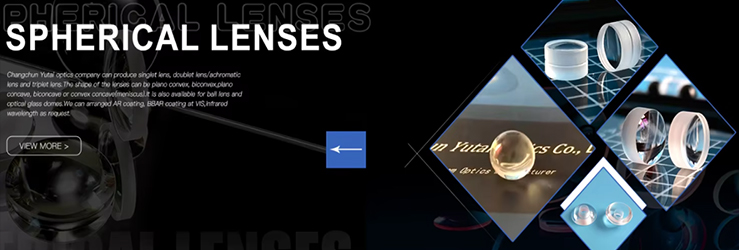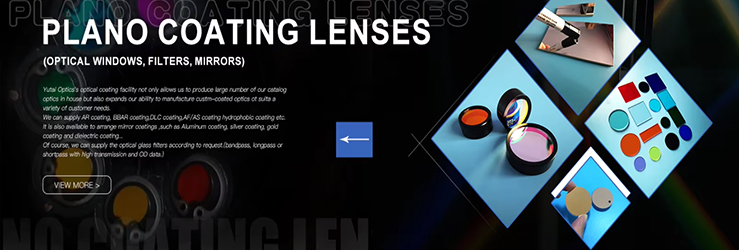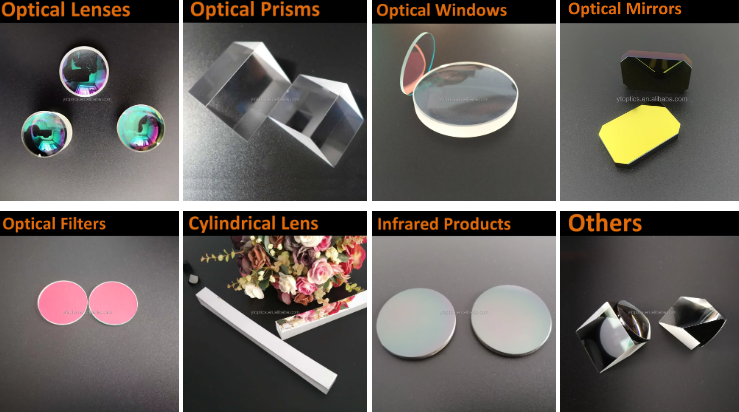Contact us
-
 Email: admin@ytoptics.com
Email: admin@ytoptics.com
-
 Tel:86-0431-87911611
Tel:86-0431-87911611
-
 Add: 2# Automotive Innovation
Add: 2# Automotive Innovation
Jilin Province, China
Optical components in various fields of application
Optical components, as an important part of modern science and
technology, play a key role in a number of fields, bringing great impact
on scientific research, technological innovation and social
development.

1. Astronomy
In astronomy, optical components are key tools for observing distant celestial bodies. Optical lenses and mirrors in large telescopes collect and focus faint starlight, enabling us to observe extremely distant and faint galaxies, stars and planets.
2. Biology
Optical microscopes are one of the most commonly used tools in biological research. The continuous improvement of optical components has led to an ever-increasing resolution of microscopes, enabling the observation of the fine structure of cells and the interaction of biomolecules. Confocal microscopy, fluorescence microscopy, etc. make use of special optical elements and techniques to achieve real-time observation and quantitative analysis of biological processes in cells. In addition, optical imaging technology is also widely used in biomedical diagnosis, such as fundoscopy in ophthalmological examination and endoscopy for internal organ examination.

3, national defence technology and aerospace field
In the field of national defence, optical components play an important role in missile guidance, satellite communications, aviation reconnaissance and so on.
4, environmental monitoring and meteorological field
Optical components also have important applications in the field of environmental monitoring and meteorology. For example, the use of optical sensors can detect the concentration of pollutants in the atmosphere, water quality parameters and soil composition.
5. High-precision photonics field
In high-precision photonics, optical components are the basis for high-precision measurements and quantum communications.
6. Laser System Field
In laser systems, optical components such as laser crystals, mirrors and lenses determine the wavelength, power, beam quality and transmission characteristics of the laser. Lasers are widely used in material processing, medical surgery, communications, scientific research and other fields, and their performance can not be improved without the optimisation and innovation of optical components.
7, medical equipment field
Optical components are indispensable in various diagnostic and therapeutic devices, such as X-ray imaging, CT scanning, optical coherence tomography (OCT), etc. The technology relies on high-quality optical components to obtain clear images of the human body, which help doctors to make accurate diagnosis and formulate treatment plans.
8. Imaging
In the field of imaging, whether traditional photography or digital imaging, optical components play a decisive role. The lens group in the camera lens can control the refraction and focusing of light to achieve clear and realistic image capture.

In short, optical components play a vital role in astronomy, biology, defence technology and aerospace, environmental detection and meteorology, high-precision photonics, laser systems, medical devices and imaging, among many other fields. With the continuous progress of science and technology, the performance of optical components will continue to improve, and their application areas will continue to expand and deepen, bringing more benefits to human scientific research, social development and improvement of the quality of life.

1. Astronomy
In astronomy, optical components are key tools for observing distant celestial bodies. Optical lenses and mirrors in large telescopes collect and focus faint starlight, enabling us to observe extremely distant and faint galaxies, stars and planets.
2. Biology
Optical microscopes are one of the most commonly used tools in biological research. The continuous improvement of optical components has led to an ever-increasing resolution of microscopes, enabling the observation of the fine structure of cells and the interaction of biomolecules. Confocal microscopy, fluorescence microscopy, etc. make use of special optical elements and techniques to achieve real-time observation and quantitative analysis of biological processes in cells. In addition, optical imaging technology is also widely used in biomedical diagnosis, such as fundoscopy in ophthalmological examination and endoscopy for internal organ examination.

3, national defence technology and aerospace field
In the field of national defence, optical components play an important role in missile guidance, satellite communications, aviation reconnaissance and so on.
4, environmental monitoring and meteorological field
Optical components also have important applications in the field of environmental monitoring and meteorology. For example, the use of optical sensors can detect the concentration of pollutants in the atmosphere, water quality parameters and soil composition.
5. High-precision photonics field
In high-precision photonics, optical components are the basis for high-precision measurements and quantum communications.
6. Laser System Field
In laser systems, optical components such as laser crystals, mirrors and lenses determine the wavelength, power, beam quality and transmission characteristics of the laser. Lasers are widely used in material processing, medical surgery, communications, scientific research and other fields, and their performance can not be improved without the optimisation and innovation of optical components.
7, medical equipment field
Optical components are indispensable in various diagnostic and therapeutic devices, such as X-ray imaging, CT scanning, optical coherence tomography (OCT), etc. The technology relies on high-quality optical components to obtain clear images of the human body, which help doctors to make accurate diagnosis and formulate treatment plans.
8. Imaging
In the field of imaging, whether traditional photography or digital imaging, optical components play a decisive role. The lens group in the camera lens can control the refraction and focusing of light to achieve clear and realistic image capture.

In short, optical components play a vital role in astronomy, biology, defence technology and aerospace, environmental detection and meteorology, high-precision photonics, laser systems, medical devices and imaging, among many other fields. With the continuous progress of science and technology, the performance of optical components will continue to improve, and their application areas will continue to expand and deepen, bringing more benefits to human scientific research, social development and improvement of the quality of life.
PREV : Changchun Institute of Optical Mechanics makes new breakthrough in inspection of ultra-large apertur NEXT : Moon probe Chang'e 6 mission a complete success

TALK TO US 86-0431-87911611
86-0431-87911611
Call us now!
 86-0431-87911611
86-0431-87911611Call us now!
ONLINE CHAT
 2433808388
2433808388

